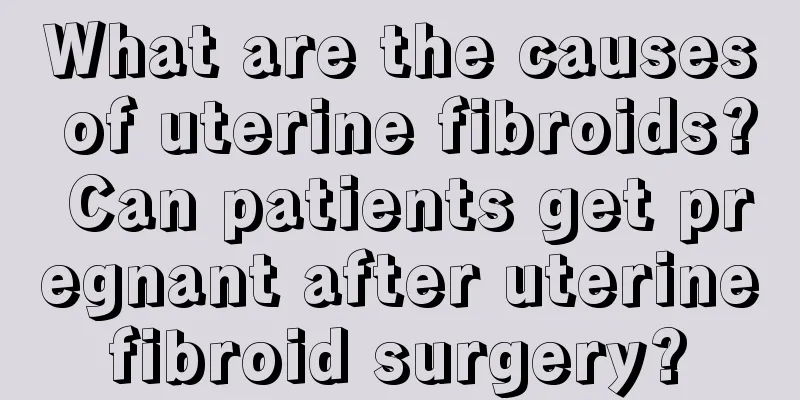What are the causes of uterine fibroids? Can patients get pregnant after uterine fibroid surgery?

|
Uterine fibroids, also known as uterine fibroids, are benign tumors formed by the proliferation of uterine smooth muscle tissue. They are one of the most common and common tumors in the female reproductive system. The most common symptoms of patients with uterine fibroids are uterine bleeding, increased menstrual volume, prolonged menstrual cycles, abdominal masses and compression symptoms. Excessive bleeding can also easily lead to severe anemia. The clinical treatment of uterine fibroids requires accurate identification of the cause of uterine fibroids for treatment. Next, please ask Ye Qingjian, attending physician of the Third Affiliated Hospital of Sun Yat-sen University, to give a detailed introduction to the clinical knowledge of uterine fibroids. What causes uterine fibroids? There is no definite cause for uterine fibroids. It is currently believed that uterine fibroids are mainly related to female hormones, including female estrogen, which may cause the growth of uterine fibroids; female progesterone may promote the growth of uterine fibroids. Uterine fibroids are divided into single and multiple. Single uterine fibroids refer to a single uterine fibroid; if there are two or more fibroids in different parts, it is called multiple uterine fibroids. How long can patients get pregnant after uterine fibroid surgery? How long can patients get pregnant after uterine fibroid surgery has a lot to do with the long part of the uterine fibroids and the surgical method. First, if the uterine fibroids grow under the mucosa, do hysteroscopic surgery, and you can start preparing for pregnancy within 2-3 months after surgery. Secondly, if the uterine fibroids grow from the subserosal membrane to the outside, this may happen 3-6 months later, and you can start actively preparing for pregnancy. Finally, if the fibroids are between the muscle walls, contraception should be practiced for 1-2 years after surgery, or even longer. Does myomectomy have any effect on the body? Myomectomy has little effect on the body. Since the uterine fibroids themselves are an abnormally growing tissue, many patients may have significantly improved menstruation after surgery, and there will be no prolonged menstruation or increased menstrual volume. If it is a uterine fibroid, the original fibroid compression symptoms will disappear, and the abdominal mass will also disappear. Patients with uterine fibroids should strictly practice contraception within half a year after resection to prevent uterine rupture. Patients also need to prevent excessive fatigue, must pay attention to rest during menstruation, keep the vulva clean and dry, clean the vulva at any time, and prevent infection. Because patients bleed too much after resection, they should also eat more iron-rich foods to prevent iron deficiency anemia. |
>>: What are the symptoms of cervical cancer? How to adjust your diet to prevent cervical cancer
Recommend
What are the symptoms of Dichlorvos poisoning?
Dichlorvos is an organophosphorus pesticide that ...
What are the early diagnosis criteria for gallbladder cancer?
What are the early diagnostic criteria for gallbl...
Will gastric mucosal prolapse cause gastric cancer?
Will gastric mucosal prolapse cause gastric cance...
What is the method of making handmade soap at home
In recent years, DIY handmade soap has become pop...
Close your eyes to nourish your liver and shake your head to boost your spirits
To nourish the liver is to close your eyes As the...
How can I make yellow clothes white?
Today's living standards are constantly impro...
Causes of Thrombotic Thrombocytopenic Purpura
Generally speaking, the occurrence of thrombotic ...
Can you eat coix seed rice for skin cancer
We often hear about skin cancer in our daily life...
The inward bending of the little finger symbolizes
It is said that hands are a person's second f...
What to do if you are bitten by fleas
Friends who have pet dogs or cats at home may eas...
Typical safety configuration of electric heating faucet
With the development of science and technology, w...
What are the correction methods for invisible overbite
Overbite is a relatively common dental manifestat...
Nausea and vomiting after scraping
Gua Sha is a common health-preserving method in l...
Sleeping posture for bulging disc
The sleeping position for intervertebral disc bul...
Steps for hand brewed coffee
Nowadays, coffee has become a drink that many peo...









